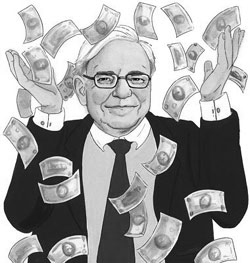Warren Buffett, listed by Forbes magazine as the world’s third wealthiest person, created a minor stir in early August by writing an op-ed piece in the New York Times calling for himself and other US millionaires and billionaires to be taxed at a higher rate. It’s easy for him to make that call because, in the current Washington climate of no-taxes-on-the-rich, it’s very unlikely to happen. However, Buffett has said similar things in the past, so there is a possibility that he really is concerned that the overreaching greed of his fellow capitalists risks causing working people to “rapidly lose faith in the ability of Congress to deal with our country’s fiscal problems”, as he put it. In that direction lie radicalisation and, eventually, revolution.
What I find more interesting about Buffett is how he amassed his billions. The Wikipedia article about him describes him as a “legendary investor”. In its way, this tells us even more about modern capitalism than his appeals to his fellow billionaires to restrain their greed.
When capitalism emerged in Britain and then Western Europe, the first capitalists and their descendants sometimes claimed that they started off with money that they had accumulated by working hard and being frugal. Who knows? – it may have been true of a few. But there were many more whose initial nest egg came from piracy, robbery, usury, slavery, swindling and so on.
New system
When the pirates etc. or their heirs became capitalists, their economic function (not their morals) changed. Their looting of the rest of society became less direct but more profitable. In the new, capitalist, system, they hired workers, who produced commodities. The capitalists sold these commodities to the public and paid the workers who had produced them a small fraction of the value. They justified this new form of robbery by claiming that the capitalists were the producers or necessary source of the commodities they brought to market.
Therefore, the initial role of the capitalist had some fairly direct connection with the production or distribution (trade) of some good that met a public demand. Capitalists were known as “iron makers” or “carters” or “miners” or “textile manufacturers” or “retailers”. This was nonsense, since the capitalists didn’t do any of the productive work, but it reflected the fact that, in the capitalist system, they performed the economic function of organising and directing production and distribution, even though they did it with the goal of maximising profits rather than social well-being.
That was then. Already a century and a half ago, Karl Marx pointed out that the capitalists were discovering that they didn’t need to run their businesses themselves: they could hire someone to do it for them and spend their entire lives enjoying the wealth that other people had created. This trend has only increased since then. But for the most part, capitalists were still concerned with particular areas of production or services. The owner of a widget factory might hire some well-paid flunky to run the place, but would notice if profits declined and would then replace the manager. In this sense, capitalists could still call themselves “widget manufacturers”.
No useful role
However, the longer capitalism survives, the less is there any pretence of a productive function for capitalists. Warren Buffett is not a “steel maker” or “publisher” or “pharmaceutical producer”; he is simply an “investor”. He owns companies that produce things, but that is not why he owns them. He buys and sells them in much the same way that a professional gambler puts money on this or that horse. He doesn’t decide how the companies he owns should buy their raw materials or organise their workforce or market their product. He doesn’t even have to know what the companies produce (other than profits), only whether their stock price is likely to rise or fall.
The functions of organising production and of ownership were united in individual capitalists two centuries ago. Now, in people like Buffett, ownership has become completely separate from any productive function. Being an investor means: he has money, and therefore society gives him more money.
Capitalists like Buffett are still a minority, but he is far from unique. Of the 40 wealthiest people in the US, according to the Forbes list of US billionaires, nine got their money from the like of “investments”, “hedge funds” and “leveraged buy-outs” – not including one whose wealth came from Microsoft and “investments”, nor one in “real estate”. This means that around one-fourth of the richest people in the USA have become billionaires merely through ownership.
Some of their wealth was seized from other owners who weren’t as clever or corrupt in managing their wealth. But most of it comes from us. We produce it; they take it. Not quite as obvious as piracy, but the results are the same.

